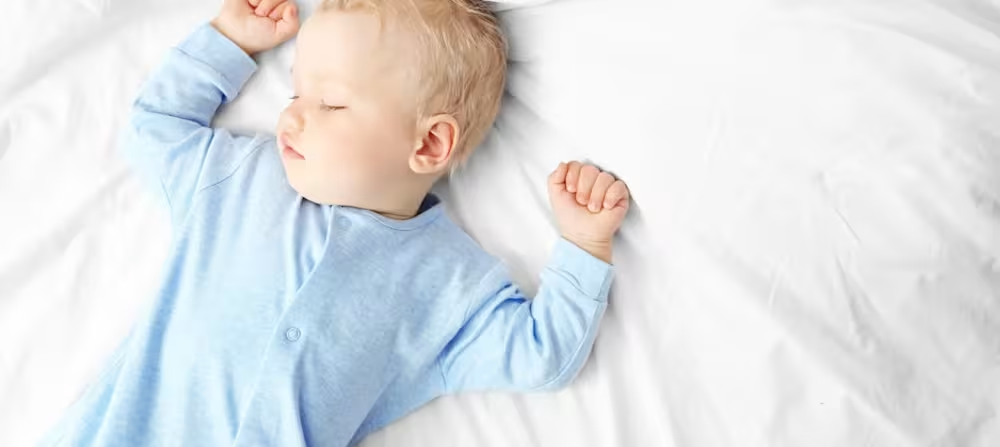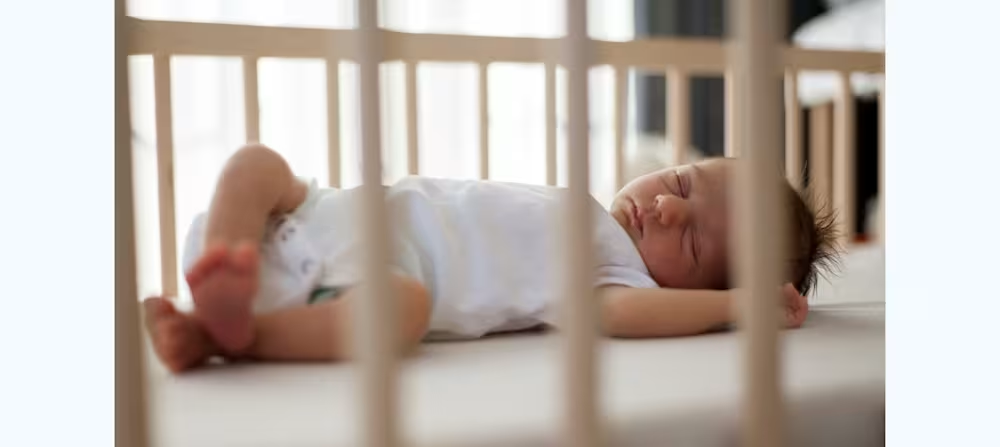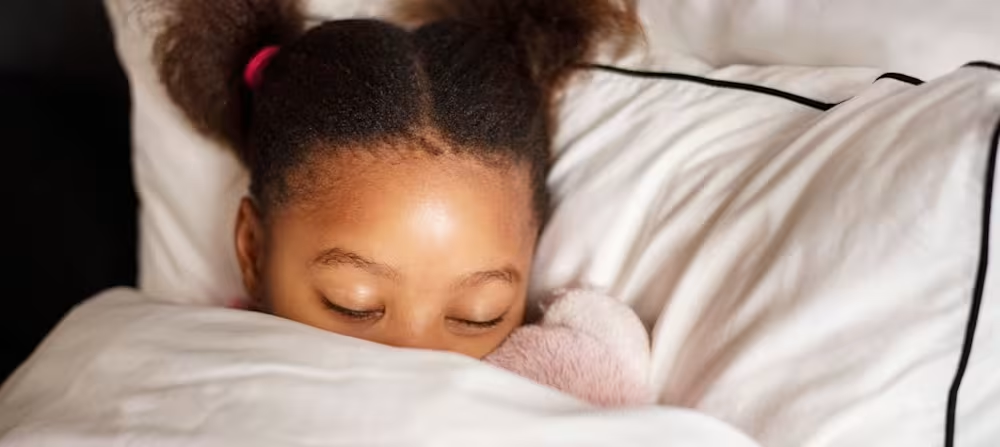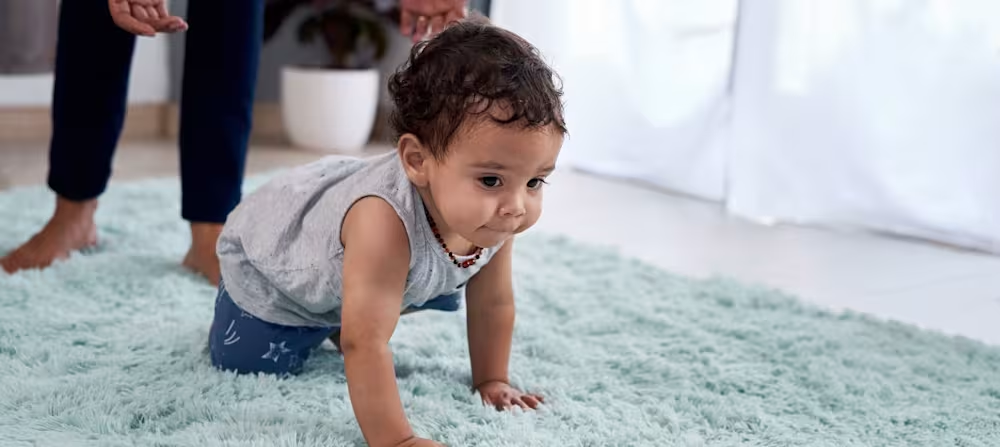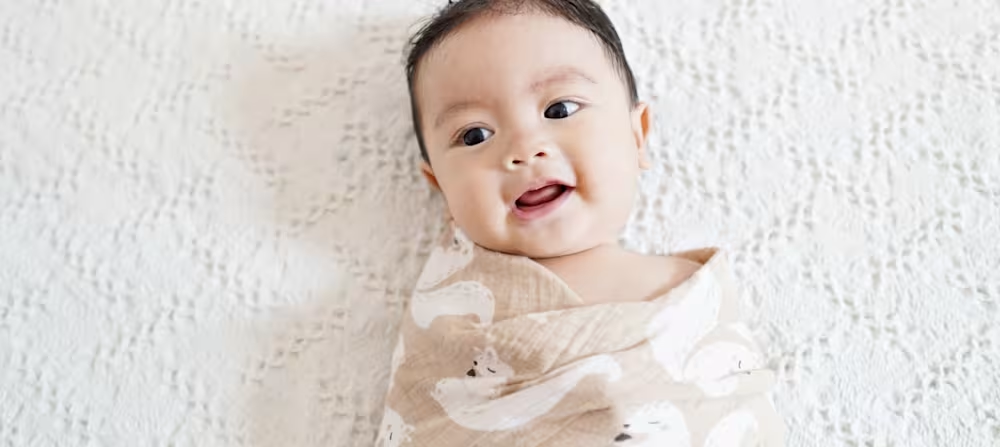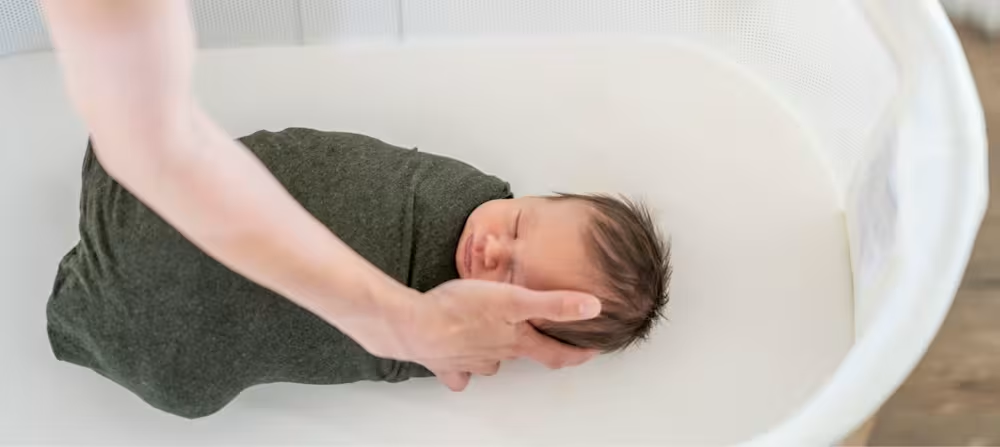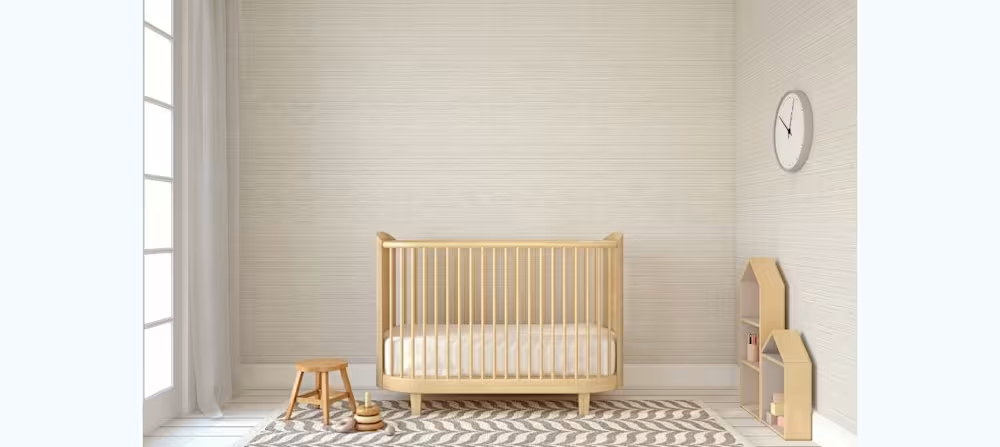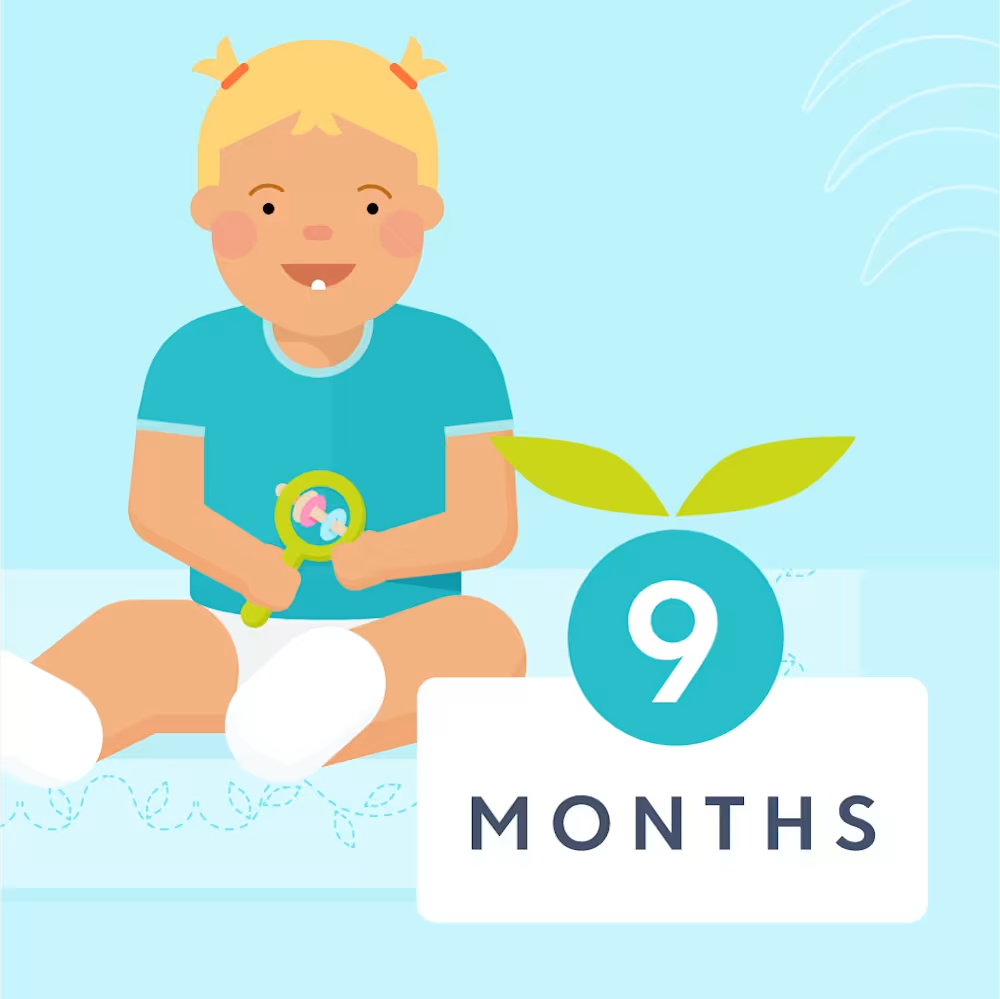When and how to transition your baby to their own room
Updated Dec 29, 2025

Deciding where your baby will sleep when they come home from the hospital is pretty easy. Most parents opt to room share in the beginning since it’s safer and easier. But at some point, you may want your bedroom back for adult activities — whether it’s spending time with your partner or just binging your favorite series without headphones. We’ll help you navigate when, and how, to make this big change.
What does a baby room or nursery look like?
The most important component of a baby room or nursery is a . The American Academy of Pediatrics (AAP) recommends a crib, bassinet, portable crib, or play yard that meets the safety standards of the Consumer Product Safety Commission (CPSC) [].
Now let’s talk about the nice-to-haves. Ideally, the nursery won’t only provide a sleeping space, but will also support a calm for your baby to cue when it’s time to transition from playtime to sleepytime. Include a diaper changing station and a place to store all those tiny pajamas and , so that dressing for bed is part of your consistent routine. A comfortable chair for feedings is a plus too.
To create a cozy ambiance, you’ll also want to think about sounds and lighting. We’re big fans of continual . Consider a noise machine for the nursery, especially if you want to muffle sounds from noisy siblings, pets, or neighbors.
A lamp for dim lighting is perfect for pre-sleep lullabies and feedings, while black-out curtains (or blinds), help darken the room during sleep times. These can help babies fall asleep easier during the summer months when the sun is still shining at bedtime, and help prevent too.
Can babies sleep in their own room from birth?
The AAP doesn’t recommend it. They want you to share a room [] (but not share a bed) with your baby for at least the first 6 months of life to reduce the risk of sudden infant death syndrome (SIDS). Not only is room sharing considered safer, but it can also be more convenient. Having your baby close by can make it easier to feed, comfort, and care for your infant throughout the night.
“Room sharing without bed-sharing is protective for the first year of life, and there is no specific evidence for when it might be safe to move an infant to a separate room before 1 year of age. However, the rates of sleep-related deaths are highest in the first 6 months, so room sharing during this vulnerable period is especially important.” (Moon, Carlin, & Hand, 2022) [] Consult with your pediatrician if you have questions about transitioning your young baby to their own room.
Do babies sleep better in their own room?
Probably. After the newborn stage, it’s common for a parent’s presence in the room to impact night sleep. Anecdotally, our room-sharing clients report more frequent night waking and less overall sleep. Research [] also suggests that room-sharing is associated with less overall nighttime sleep and reduced sleep consolidation.
Typical nighttime noises from parents like snoring, coughing, and moving around may cause their baby to stir (and vice versa). And once they’re awake, it can be harder for a little one to go back to sleep on their own after they see, hear or smell their parents. Cue the crying out for mom or dad.
Which age is optimal for transitioning a baby to their own room?
We recommend transitioning children to their own room between 6 - 9 months of age. That is, if your primary goal is to improve sleep and minimize the challenges that can come with moving an older baby or toddler to a new room.
However, parents who want to make the move when it feels right to them emotionally will need to make that decision on an individual basis. One caregiver may feel happy with the move at 4 months, while another might not be ready until their child is 2 years old.
If your goal is to reduce the risk of sleep-related death as much as possible, then the ideal age to transition to a new room is after your child’s first birthday. You can view our safety-based chart below:
Signs your baby is ready for their own room
Here are some signs your baby is ready for their own room:
Your baby’s 6 months or older
Your baby’s waking frequently
Your sleep is suffering
You’re expecting a new baby
You’ve decided to sleep train
Find more details below:
Sign #1: Your baby’s 6 months or older
It’s well established that sharing a room is safer [] than bed sharing or solitary sleeping (when the baby sleeps in a separate room) in the first 6 months of life. While it might be tempting to reclaim your room while in the midst of the , the AAP recommends holding off a bit longer to reduce the risk of sleep-related injury and death.
Sign #2: Your baby’s waking frequently
To clarify, it’s normal for babies to wake at night for feeding and/or comfort. Additionally, research [] has shown that babies will awaken briefly throughout the night throughout the first year, even if they don’t call out for their parents. However, if your baby is waking a lot (i.e. not just for hunger or discomfort), and wants your help to fall back asleep each time, then transitioning away from room sharing may reduce some of those wakings.
Sign #3: Your sleep is suffering
Yes, it’s common for parents to wake their baby during the night, but it works the other way around too. Babies can be noisy sleepers! If room sharing is negatively impacting your sleep, moving your baby into their own room may improve your sleep as well.
Sign #4: You’re expecting a new baby
New baby on the way? You’ll want to consider what the sleeping arrangements will look like after the baby arrives. If you plan on room sharing with the newborn only, we recommend transitioning the sibling to their own room sooner rather than later. This will allow time for your older kid to adjust, while also ensuring that they don’t feel displaced by the new baby.
Sign #5: You’ve decided to sleep train
Sure, you can while room sharing. But if you’re working on sleep training throughout the night (as opposed to naps or bedtime only), room sharing can bring extra challenges. We typically find that clients will make slower progress while room sharing since children are more likely to call out for their parents during night wakings when they can see or hear them.
Tips for smoothly transitioning your baby to their own room
Tip | Why it helps | How to put it into practice |
|---|---|---|
Hang out in their new room | Familiarity reduces stress and helps your baby view the space as safe and enjoyable before sleep ever happens there. | Play in the room for short sessions a few times a day. Keep it upbeat with songs, peek-a-boo, or favorite books. |
Use consistent sleep cues | Routines signal that sleep is coming, even when the environment changes. Predictability builds security. | Follow your usual bedtime and nap routines, both before and after moving your baby into their own room. |
Choose a transition pace that fits your family | Some babies adjust quickly, while others need gradual change depending on age and temperament. | Move all sleep to the new room at once, or start with a single nap or bedtime and build from there if a slower shift feels better. |
Be patient with the adjustment | Babies often need time to adapt to a new sleep space | Expect some bumps early on. Offer reassurance, stay consistent, and give your child time to settle into the change. |
Find more details below:
Tip #1: Spend time in the new room
Help your baby gradually acclimate before the transition. Spend some play time in the new room for 10 - 15 minutes several times a day for a few days leading up to the transition. Keep the mood light to help your baby feel secure. Try singing upbeat songs, playing peek-a-boo, or looking at some books together.
Tip #2: Use established sleep cues
Introduce a pre-bedtime routine while you’re room sharing. Consistent bedtime routines can help your baby know what to expect (i.e. sleep comes after the routine) and help children feel secure [].
Continue to use your established bedtime and nap routines once you start placing your baby to sleep in their own room. This will provide a strong signal to your baby when it’s time to sleep in the new room — it can help little ones understand that it’s time to sleep after the routine even if they’re in a new setting.
Tip #3: Set the speed that’s right for your family
If you prefer a faster adjustment, it’s fine to start placing your baby in their room for all sleep periods: bedtime, throughout the night, and for naps. This tends to work best for younger babies.
Babies older than 8 - 9 months tend to be more aware of their surroundings. As a result, it might take them longer to accept their new room which may lead to sleep challenges like fighting sleep. In those cases, you can opt to make gradual changes.
If you want to go the gradual route, start by placing your baby in the new room for the first nap of the day and then progress to all naps. Alternatively, place your baby in the new room for bedtime only, and then room share after the first night waking. This works best for situations where the baby has one sleep surface in the parents’ room (e.g., a bassinet or pack and play) and another sleeping surface in their own bedroom (like a crib).
Tip #4: Be patient
Expect that your child may need some time to adapt to the room switch. How quickly that occurs will depend on their temperament (some children are quicker to adapt than others) and their age. Generally, a younger baby will adjust a lot faster to changes in sleep habits than an older child who has developed a greater awareness of their world.
Takeaway
The AAP recommends sharing a room (not a bed) with your baby for at least the first 6 months of life to reduce the risk of sudden infant death syndrome (SIDS). Sharing a room with a young baby is considered safer and is also more convenient for things like feeding, comfort, and care overnight.
We recommend transitioning children to their own room between 6 - 9 months of age. However, some parents will want to move their little one to their own room sooner and some will opt for later — ultimately, the choice is up to caregivers.
Signs your child may be ready for their own room include: your baby is 6 months or older, they're waking frequently, your sleep is suffering, you're expecting a new baby, or you've decided to sleep train.
To smoothly transition your child to their own room, consider spending time in the new room first, use established bedtime routines, go at a speed that suits your family, and be patient — it may take some time for your little one to adapt to switching rooms.
Share article:
Note: The content on this site is for informational purposes only and should not replace medical advice from your doctor, pediatrician, or medical professional. If you have questions or concerns, you should contact a medical professional.
6 Sources
Share article:
